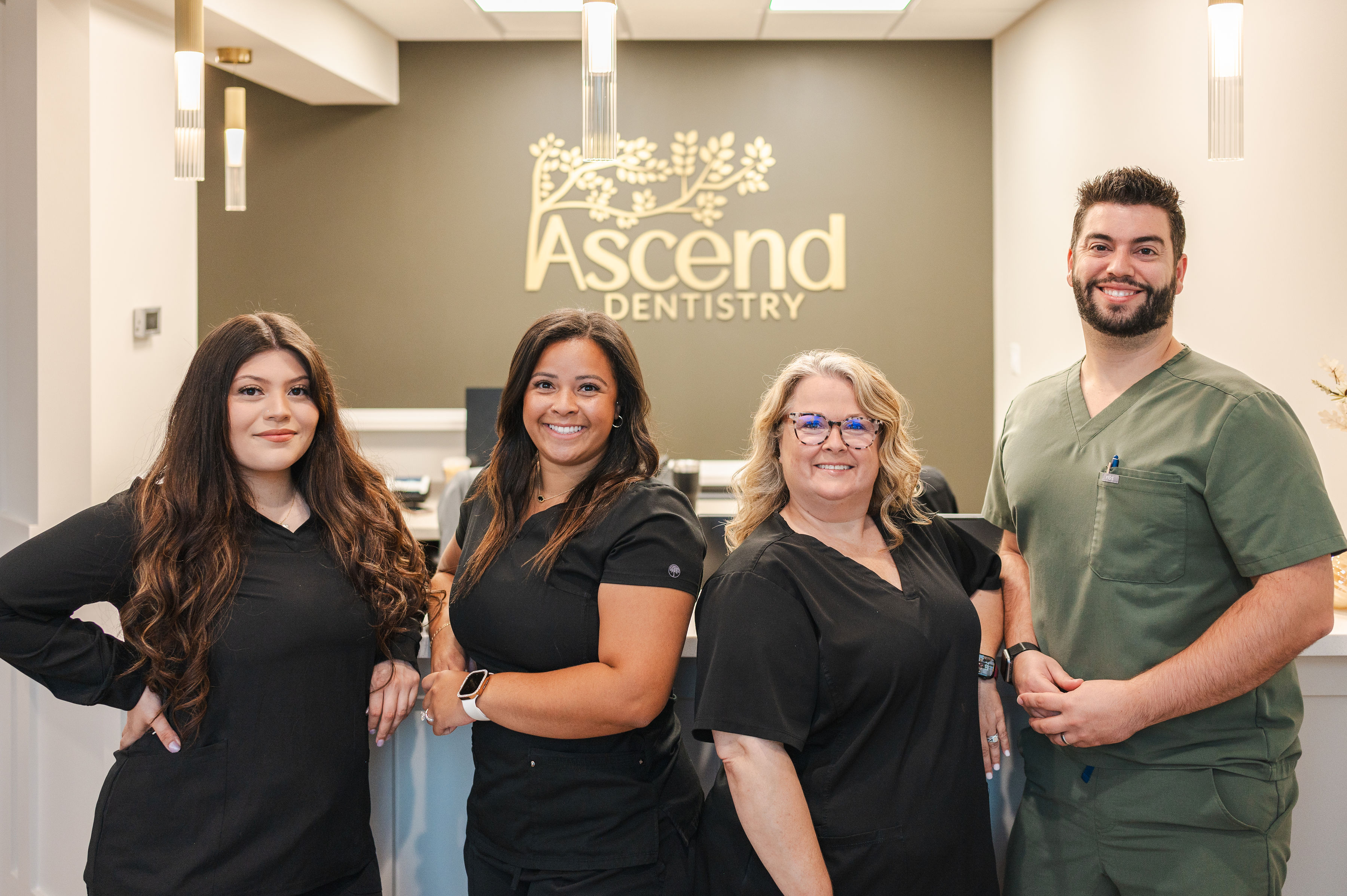Why People Love Ascend Dentistry
%20(1).webp)
Why Choose Dental Implant Surgery?
Dental implant surgery provides a permanent, functional solution for tooth replacement, designed to replicate the appearance and strength of natural teeth. Implants are secured directly in the jawbone, offering stability and longevity not achievable with traditional dentures or bridges. Key benefits of dental implants include:
- Enhanced Stability: Implants are rooted in the jaw, providing a stable foundation for chewing and speaking.
- Bone Preservation: Implants prevent bone loss, maintaining the jaw structure and supporting facial aesthetics.
- Long-Term Durability: With consistent care, implants can last a lifetime, offering lasting value.
- Improved Function and Appearance: Implants look, feel, and function like natural teeth, boosting both confidence and oral health.
Types of Dental Implants We Offer
Ascend Dentistry provides several implant options tailored to different needs:
- Single-Tooth Implants: Replacing a single missing tooth, this standalone implant and crown solution ensures both stability and aesthetics.
- Implant-Supported Bridges: A solution for multiple missing teeth, supported by strategically placed implants, providing stability without affecting adjacent natural teeth.
- Full Mouth Implants: Comprehensive restoration for patients missing most or all teeth, with multiple implants supporting a full-arch prosthesis.
Same-Day Implants: For eligible patients, implants and restorations may be placed on the same day, reducing total treatment time.


Benefits of Dental Implant Surgery
Dental implants offer significant advantages over traditional methods for tooth replacement:
- Permanent Tooth Replacement: Implants fuse directly with the bone, providing a long-term, reliable solution.
- Natural Look and Feel: Implants replicate the appearance and function of natural teeth.
- Bone Preservation: Implants prevent bone resorption, preserving the structure of your jaw and facial aesthetics.
Enhanced Functionality: Dental implants enable improved chewing and speaking ability, ensuring comfort and confidence.
The Dental Implant Surgery Process
Initial Consultation and Planning
Placement of the Implant
Healing and Osseointegration
Abutment and Restoration Placement
Take Your Smile to a Whole New Level

Flexible Solutions Tailored to You
Continuous Care for Lasting Oral Health

Do You Take My Insurance?

Free Consultations to Explore Your Options
Frequently Asked Questions
How do I know if I’m a candidate for dental implant surgery?
Determining suitability for dental implant surgery involves assessing a few factors, such as:
- Bone Density: Sufficient bone volume is critical, as implants require a stable base. For those with bone loss, procedures like bone grafting can help.
- Gum Health: Healthy gums contribute to better healing and support for the implant. Patients with periodontal concerns may need pre-treatment.
- Overall Health: Factors like smoking and medical conditions (e.g., diabetes) can affect healing times and success rates. Our team reviews your medical history to create a safe, effective treatment plan.
A consultation will provide clarity on your specific situation, with our team outlining any preparatory steps if needed.
What is the recovery process like after dental implant surgery?
The recovery journey after dental implant surgery generally spans several stages:
- Immediate Aftercare: In the first 24-48 hours, mild swelling and bleeding are common. Resting and using an ice pack can minimize discomfort.
- Short-Term Healing: Minor soreness may persist for a few days. Over-the-counter medications like ibuprofen help manage pain. Stick to soft foods to avoid irritating the surgical area.
- Long-Term Healing (Osseointegration): During the next few months, the implant naturally integrates with the bone, providing stability. This phase is crucial for the implant's success.
Proper care, including avoiding smoking and maintaining oral hygiene, is essential for healing and the longevity of the implant.
Are dental implants covered by insurance?
Dental implant coverage varies widely by provider and plan. Many plans do not cover implants fully but may cover:
- Preparatory Procedures (e.g., extractions, bone grafting) if deemed medically necessary.
- Medically Necessary Implants for patients where missing teeth impact daily functions like chewing or speaking.
During your consultation, our staff will help you understand your benefits, review financing options, and explore flexible payment plans to ensure that implant treatment is affordable and accessible
What is a sinus lift, and when is it needed for implants?
A sinus lift, or sinus augmentation, is a procedure to increase bone in the upper jaw near the molars and premolars. It is often recommended when:
- Bone Loss Occurs in the Upper Jaw: Tooth loss leads to bone resorption over time.
- Sinus Position Limits Implant Space: For some patients, the sinus cavity is close to the upper jaw, requiring a bone graft to create space for implants.
During a sinus lift, bone material is added to the sinus floor, ensuring a sturdy base for implants. Our team uses imaging to assess whether this procedure will benefit you, ensuring that your implants are secure and long-lasting.
How long do dental implants last?
Dental implants are designed to last a lifetime with proper care. Key factors affecting longevity include:
- Oral Hygiene: Brushing, flossing, and regular dental check-ups are essential.
- Lifestyle: Avoiding smoking and teeth grinding helps prolong implant life.
- Routine Dental Visits: Professional cleanings and check-ups allow your dentist to monitor the implant’s health.
With consistent care, dental implants can outlast other types of restorations, providing stability and function for decades.
What are the potential risks of dental implant surgery?
While dental implant surgery is highly successful, understanding potential risks prepares you for the procedure:
- Infection: This can be minimized with proper hygiene and, if necessary, antibiotics.
- Nerve Damage: Rare but can cause temporary numbness or tingling near the implant site.
- Sinus Complications: Implants placed in the upper jaw may occasionally affect the sinuses, especially with insufficient bone.
Our experienced team utilizes advanced techniques to reduce risks, ensuring a smooth, comfortable experience.
What can I expect during a dental implant consultation?
During a consultation, we’ll walk you through the entire implant process. You can expect:
- Comprehensive Dental Health Assessment: We take X-rays or scans to evaluate your bone and tooth structure.
- Discussion of Treatment Options: Based on your needs, we review options like single implants, full-mouth restorations, or bridges.
- Financial Overview: We provide detailed cost estimates and review financing options to make treatment accessible.
This consultation helps you make an informed choice and begin a customized treatment plan.

.webp)





